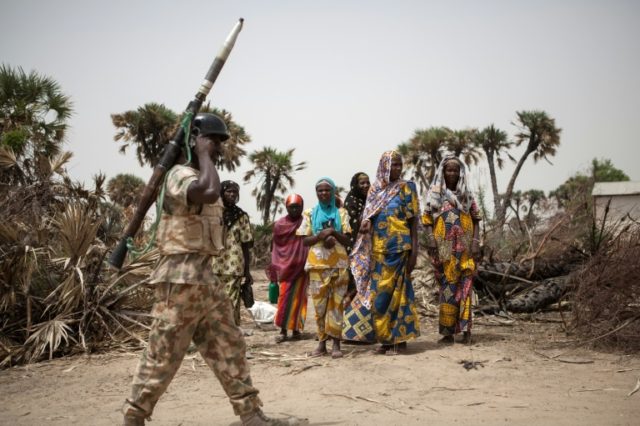A study by the global insurer Lloyd’s found that Nigeria may be losing $437 million a year in terrorism losses, the Nigerian newspaper Vanguard reported on Monday. Nigeria is home to several Islamist insurgencies, most notably the Islamic State affiliate Boko Haram and the violent Fulani herdsmen.
Vanguard cites Lloyd’s 2018 City Risk Index as finding that Nigeria “could lose $437 million, about N157.32 billion, of its Gross Domestic Product, GDP, annually to terrorism, to rank third in the world on forecast GDP loss.” While Nigeria’s most active terrorist groups are primarily active in the northeast – Borno state is the birthplace of Boko Haram – Lloyd’s reportedly cited Nigeria’s largest city, Lagos, as one of the regions of highest concern. Lagos is a coastal city in the nation’s southeast, in the heart of Nigeria’s Christian population. Nigeria is nearly evenly divided between Christian and Muslim populations. The service noted concerns regarding climate change as high on the list of potential disasters that could bring down the GDP of the city.
“Lagos, the largest city in oil-rich Nigeria, faces geopolitical and security threats,” the Lloyd’s report read, according to Vanguard. “Lagos is a coastal city and will most likely be affected adversely by sea level rise caused by climate change. For example, flooding in 2017 caused disruption and economic loss in the Lekki and Victoria Island areas of the city. Rising water levels which could also assist the spread of disease and human pandemic is the fourth-costliest risk, about $265 million, facing the city.”
A collapse in the Nigerian economy, Africa’s largest, could be devastating for the continent. The World Bank notes that Nigeria is home to 47 percent of West Africa’s population and relies heavily on oil to keep its GDP afloat, which hurts its stability. Nigeria is large enough that many corporations invest in works in the south of the country without worrying about Boko Haram or the Fulani in the central and northern regions of the country but, if President Muhammadu Buhari does not curb the insurgencies soon, they may grow to threaten the whole of the nation.
The Fulani herdsmen are a Muslim group and typically clash with Christian farmers, who the herdsman complain are taking away their grazing land to grow crops. In the most recent terrorist attack by the Fulani, herdsmen killed 120 people and burned down dozens of homes in several villages in central Plateau state, not far from the capital, Abuja. Nigerian military officials confirmed 11 deaths, then 56, then 86, though local media say the number is far above 100, and counted hundreds of additional casualties.
Buhari issued a statement on Twitter calling the atrocity “very painful and regrettable” and asserting, “We will not rest until all murderers and criminal elements and their sponsors are incapacitated and brought to justice.”
Boko Haram, meanwhile, continues to plague the nation’s northeast. Local sources told the Associated Press (AP) that four civilians were killed this weekend in Borno state in a raid and suicide bomb attack that also resulted in the burning of homes and vehicles. While Boko Haram has released many of the girls and women it has abducted since escalating its mass kidnapping operations in 2014, at least one girl abducted this year, 15-year-old Leah Sharibu, remains in captivity because she has refused to embrace Islam and abandon her Christian faith. The other 110 girls kidnapped from her school in Dapchi have seen been released.

COMMENTS
Please let us know if you're having issues with commenting.